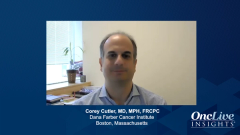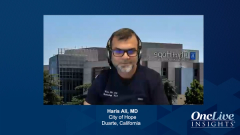
HSCT Approaches to Retain GVL While Preventing GVHD
Expert perspectives on novel transplantation strategies to prevent or improve outcomes in graft-versus-host disease.
Episodes in this series

Transcript:
Corey Cutler, MD, MPH, FRCPC: Retaining GVL [graft-versus-leukemia] while eliminating GVHD [graft-versus-host disease] is the holy grail of transplantation. We've established that we can do this in urine models for years but have not yet translated those results into humans. The big challenge is figuring out which drug is the right drug for an individual patient. You must understand that often, chronic GVHD occurs 6 to 12 months following transplant, at which point stochastically, most patients will have relapsed. At that point, we're less concerned about maintaining GVL, as we’ve already moved to agents that target immunosuppressive drugs so they don't suppress the entire immune system. We are not sure what the most important arm of a full GVL response is, so by targeting subsections of the immune system, either cytokine signaling or reactions at the germinal center, we might preserve GVL, but we don't actually know how to separate the two at this point. That's the holy grail.
There was a recent publication from the Fred Hutch group led by Marie Bleakley [MD, PhD, MMSc], which looked at naïve T-cell depletion. T-cell depletion has a long history in stem cell transplantation; we were doing that at Dana-Farber far before I arrived here, before the year 99. Unfortunately, T-cell depletion as a mechanism to prevent GVHD has never been demonstrated superior to standard pharmacologic approaches. In one recent blood and marrow transplant clinical trial network study, one of the progress II trials, showed it was inferior to pharmacologic prevention of chronic GVHD. Finding novel ways of doing this is important. The report from Bleakley is a nice step forward. We must recognize that this is a single institution phase 2, actually 2 institutions but it was a phase 2 experiment and needs to be confirmed in a randomized setting, which to the investigators credit they are currently doing. We'd like to see those results, we all want to move forward with T-cell depletion if it's the right approach. There are many other approaches to T-cell depletion, beyond simple differentiating of naïve and memory T-cells, and it remains to be seen which of these approaches, if any, is superior to pharmacologic prevention for GVHD prevention.
Haris Ali, MD: This was exciting data that was presented and published recently on JCO [Journal of Clinal Oncology]. Basically, there's several repertoire of T-cells, memory, and naive T-cells. Patients with the animal model, where there was a depletion of naive T-cells, the GVHD was reduced without affecting the graft versus leukemia effect. This study was looking at [over 100] patients who had it, and they had a good follow-up of 3 years, and saw good overall survival rate with the reduced risk of relapse and a very low acute and chronic GVHD.
Transcript edited for clarity.









































